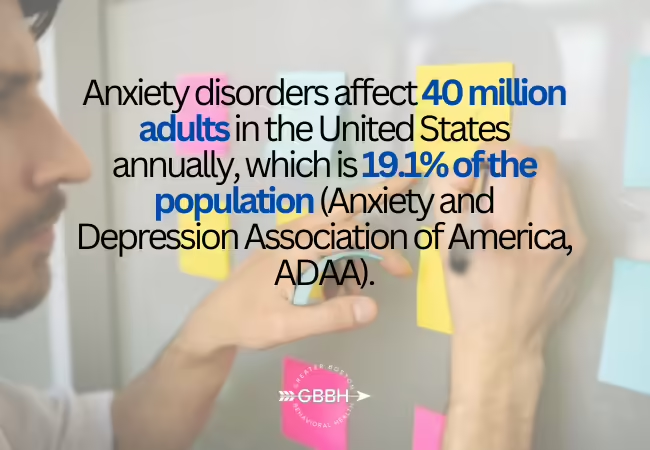While occasional stress is normal, persistent anxiety can interfere with daily life, relationships, and overall well-being. Recognizing when anxiety becomes more than just a fleeting feeling is crucial to getting the help you need. Whether you’re in Boston or beyond, understanding the signs and seeking the right support can lead to a healthier, more balanced life.
Understanding Anxiety
Anxiety manifests differently for everyone. For some, it may show up as constant worry or restlessness; for others, it might involve physical symptoms like a racing heart, sweating, or difficulty sleeping. These symptoms often go unnoticed or are dismissed as “normal,” but when they persist or worsen, they may point to an underlying issue that needs attention.
The good news is that help is available. In fact, behavioral health in Boston has become a cornerstone for individuals looking to improve their mental well-being. If you’re struggling, it’s important to remember that you don’t have to face anxiety alone.
Common Anxiety Disorders
- Generalized Anxiety Disorder (GAD): Characterized by chronic worry about everyday matters, such as finances, health, or relationships.
- Panic Disorder: Involves sudden, intense panic attacks that can feel debilitating and are often accompanied by physical symptoms like chest pain or dizziness.
- Social Anxiety Disorder: Marked by extreme fear of social situations due to concerns about judgment, embarrassment, or rejection.
- Specific Phobias: Intense fear of particular objects or situations, such as flying, heights, or spiders.
- Obsessive-Compulsive Disorder (OCD): Includes intrusive thoughts (obsessions) and repetitive behaviors (compulsions) aimed at reducing anxiety.
Signs It’s Time to Seek Help
Here are some common indicators that it might be time to explore professional support:
- Difficulty Managing Everyday Tasks
Feeling overwhelmed by daily responsibilities, even small ones, can be a red flag. If anxiety prevents you from completing tasks or meeting deadlines, it’s time to consider seeking help. - Persistent Physical Symptoms
Physical signs like tension headaches, stomach issues, and fatigue often accompany anxiety. When these symptoms don’t go away, they can take a toll on your physical health as well. - Avoiding Social Situations
If fear or worry about social interactions leads to isolation, it could indicate an anxiety disorder. Addressing this early can help prevent further withdrawal. - Trouble Sleeping
Insomnia or restless nights due to racing thoughts is another common sign of anxiety. Without proper rest, your mental and physical health can deteriorate over time. - Frequent Panic Attacks
Experiencing sudden, intense episodes of fear or dread—often with physical symptoms like shortness of breath or chest pain—may signal panic disorder, a specific type of anxiety.
How Professional Treatment Can Help
Anxiety is one of the most treatable mental health conditions, and a variety of evidence-based approaches are available. At a Mental Health Treatment Center in Boston, individuals can access therapies and programs tailored to their unique needs.
1. Cognitive Behavioral Therapy (CBT)
- CBT Therapy focuses on identifying and challenging negative thought patterns that fuel anxiety.
- Teaches practical coping skills for managing triggers and reducing worry.
- Often considered the gold standard for treating anxiety disorders.
2. Dialectical Behavior Therapy (DBT)
- DBT Therapy emphasizes emotional regulation and distress tolerance, making it effective for individuals with intense anxiety or co-occurring emotional challenges.
- Incorporates mindfulness practices to reduce the impact of anxious thoughts.
3. Anxiety Treatment Programs
- Structured Anxiety Treatment Programs provide comprehensive care, combining therapy, medication management, and holistic approaches like mindfulness and yoga.
- Ideal for individuals experiencing significant impairment due to anxiety.
4. Holistic Mental Health Therapy Programs
- Incorporates practices like breathing exercises, meditation, and art therapy to complement traditional therapies.
- Includes group therapy and family therapy to build support networks and reduce feelings of isolation.
When to Seek Help for Anxiety
While occasional anxiety is manageable, it’s essential to seek professional help when symptoms become severe or start affecting daily life. Below are key indicators that it’s time to reach out:
1. Impact on Daily Life
- Struggling to complete daily tasks, perform at work, or manage relationships due to anxiety.
- Avoiding social situations, travel, or decision-making because of persistent fear or worry.
2. Intensity and Duration of Symptoms
- Feeling anxious most days for six months or more.
- Experiencing frequent panic attacks or episodes of intense fear.
3. Physical Health Concerns
- Chronic headaches, muscle pain, or fatigue related to stress or worry.
- Experiencing physical symptoms like chest pain or shortness of breath without a medical cause.
4. Co-Occurring Mental Health Issues
- Symptoms of depression, such as loss of interest, sadness, or fatigue, alongside anxiety.
- Difficulty managing emotions or coping with stress.
Tips for Managing Anxiety Between Therapy Sessions
In addition to professional treatment, self-help strategies can help individuals manage anxiety symptoms and improve emotional resilience.
1. Practice Mindfulness
- Engage in meditation, deep breathing, or grounding exercises to stay present and calm.
2. Maintain a Healthy Lifestyle
- Prioritize regular physical activity, balanced nutrition, and quality sleep.
3. Limit Stimulants
- Avoid excessive caffeine or sugar, as they can exacerbate anxiety symptoms.
4. Develop a Routine
- Establish consistent daily habits to reduce uncertainty and promote stability.
5. Build a Support System
- Connect with trusted friends, family, or support groups for encouragement and understanding.
Treatment Options for Anxiety
Anxiety is treatable, and there are several evidence-based approaches available. In Boston, many people turn to comprehensive programs designed to address anxiety and related mental health concerns. At Greater Boston Behavioral Health, we provide effective solutions for individuals struggling with anxiety and depression.
Here’s a look at some of the treatment methods that can help:
1. CBT Therapy (Cognitive Behavioral Therapy)
CBT helps individuals identify and change negative thought patterns and behaviors that fuel their anxiety. By addressing these core issues, CBT equips people with healthier coping strategies.
2. DBT Therapy (Dialectical Behavior Therapy)
DBT Therapy is particularly effective for individuals experiencing intense emotions or self-destructive behaviors. It combines cognitive techniques with mindfulness practices, teaching individuals how to regulate their emotions and manage distress.
3. Anxiety Treatment Programs
Specialized Anxiety Treatment Programs offer targeted support, often including individual and group therapy sessions. These programs address anxiety disorders through tailored approaches, ensuring that each person gets the care they need.
4. Depression Treatment Programs
Anxiety and depression often go hand in hand. For those dealing with both, Depression Treatment Programs can provide comprehensive care to address overlapping symptoms and improve overall mental health.
5. Mental Health Therapy Programs
Through structured Mental Health Therapy Programs, individuals can work through their anxiety with licensed professionals in a safe and supportive environment.
Why Choose Greater Boston Behavioral Health
If you or someone you know is looking for professional help, Greater Boston Behavioral Health offers some of the most effective mental health treatment programs in the area. Located in Needham, MA, we specialize in providing support for individuals aged 18 and above through partial hospitalization and intensive outpatient services.
Our services include:
- Comprehensive mental health therapy programs for anxiety, depression, and other mental health disorders.
- Tailored behavioral health in Boston programs to meet individual needs.
- An employee assistance program to help organizations support their staff’s mental well-being.
As a trusted mental health treatment center in Boston, we pride ourselves on providing compassionate, effective care. Whether you need CBT therapy, DBT therapy, or an in-depth anxiety treatment program, we’re here to help you take the first step toward recovery.
The Importance of Seeking Help
Living with anxiety can feel isolating, but you’re not alone. Millions of people experience similar struggles, and there’s no shame in seeking help. In fact, recognizing that you need support is a sign of strength.
At Greater Boston Behavioral Health, we believe everyone deserves access to high-quality care. Our mental health treatment programs are designed to empower individuals, helping them regain control of their lives. With the right tools and support, it’s possible to reduce anxiety and live with greater confidence and peace.
Final Thoughts
Anxiety doesn’t have to control your life. By recognizing the signs early and seeking professional help, you can regain a sense of calm and balance. Whether through therapy, structured programs, or holistic practices, there is a path to recovery.
Contact Greater Boston Behavioral Health at (888)278-0716 to learn more about our programs and take the first step toward lasting relief and emotional wellness.
FAQs on When to Seek Help for Anxiety
What are the common signs of anxiety?
Common signs include persistent worry, restlessness, difficulty concentrating, physical symptoms like rapid heartbeat or stomachaches, and avoidance of certain situations or triggers.
How do I know if my anxiety requires professional help?
If anxiety interferes with daily life, causes significant distress, or persists for six months or more, it’s time to seek professional support through an Anxiety Treatment Program or therapy.
What are the best treatment options for anxiety?
Effective treatments include CBT Therapy, DBT Therapy, and structured Mental Health Treatment Programs that combine therapy, medication, and holistic approaches.
Can anxiety be treated without medication?
Yes, therapies like CBT Therapy and DBT Therapy are highly effective for managing anxiety without medication. Holistic practices like mindfulness and yoga can also help.
What types of anxiety disorders require treatment?
Treatment may be needed for Generalized Anxiety Disorder (GAD), Panic Disorder, Social Anxiety Disorder, Specific Phobias, and Obsessive-Compulsive Disorder (OCD).
Can therapy really help with anxiety?
Yes, evidence-based therapies like CBT and DBT teach practical skills to manage anxiety, change thought patterns, and improve emotional regulation, significantly reducing symptoms.


